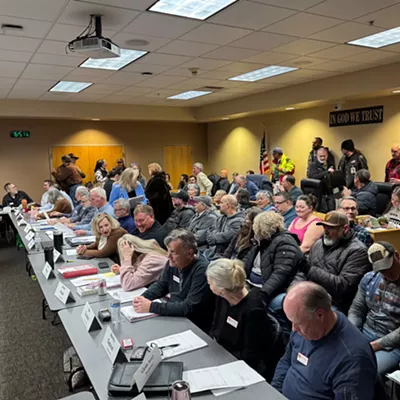
At first glance, the race for Kootenai County assessor appears settled. There's only one candidate on the ballot, after all.
However, after accusations that he's failed at the basic responsibilities of his job and created a hostile workplace, current assessor and incumbent Béla Kovacs — who was appointed to his job after the death of the previous officeholder — is facing a write-in candidacy by one of his lead appraisers, Bob Scott. Meanwhile, county leadership has asked Kovacs to resign and slashed his pay in half.
Since he was appointed by Kootenai's three-member Board of County Commissioners in spring 2020, Kovacs has created a bad working environment, according to letters written earlier this year by his employees that were given to the commissioners and the Coeur d'Alene Press. They say that Kovacs has "unpredictable moods," is "rude and demeaning to staff," created an environment of "anxiety" and "fear of retaliation," and is "disrespectful" to those he works with. He had similar issues when he worked for Spokane County, according to a former coworker.
In addition to the letters, before Kovacs ran and won against Scott in the May primary for the Republican slot in this November's general election, 34 current and former staff signed a statement of no confidence in Kovacs.
Still, Kovacs beat Scott and secured his spot on the ballot. No Democrat is running for the office.
Kovacs' office then failed to meet multiple statutory deadlines over the summer. Deadlines were missed in June, July and August to update the property rolls, according to county staff.
County leaders say that's a big deal, because assessments are a key factor used to figure out property taxes. Idaho's levy-based property tax system uses property values and budgets for each of the 60-plus taxing districts (think fire departments, schools, etc.) to calculate how much each property owner owes each year.
"You have to have good, accurate and timely assessments in order to levy a tax, and when that doesn't happen that really impedes and puts in jeopardy the welfare of the people of the county," says Kootenai County Commissioner Bill Brooks, a Republican who has been on the board for nearly four years. "The people who are doing these essential services, if their agencies don't get the money in the right amount, or on time, it's very serious."
Brooks says the commissioners have received concerns from staff and other elected county officials, and they all agreed Kovacs should go.
"We've asked him politely to vacate that office, to resign, and he has adamantly and vehemently refused to even consider it," Brooks says.
So in August, the commissioners cut Kovacs' salary in half, from $90,000 per year to $45,000, effective Oct. 1.
"That's the first time that's ever happened in the history of Kootenai County," Brooks says. "It's kind of a last resort."
Kovacs, who did not respond to multiple messages seeking comment for this article, remains on the job and in the race. Meanwhile, his opponent Scott (the only person to officially file a write-in candidacy) and other people who've worked with him are trying to inform the public about his unacceptable job performance.
"The bottom line is that the reason I'm running is because we need someone else in that leadership role," Scott says. "He has proven himself to not be able to do the job."
MISSED DEADLINES
Kovacs got the job in May 2020 after the death of assessor Rich Houser. As outlined in state law, the county commissioners were presented with three candidates chosen by members of Houser's party. In this case, it was up to the Kootenai County Republican Central Committee.
Brooks says that his main concern was hearing how each of the three candidates would value property, one of the primary roles of the assessor's office. Kovacs, who has worked as a real estate agent, was the only candidate who had a good explanation, Brooks says, outlining how he would look at comparable sale prices, income, and the cost to replace a structure if it were built new.
"What I didn't see and couldn't see, is there's no way to tell how a person works in a company situation with employees, his personality," Brooks says, "and that's where I think we began to have problems."
Scott, who has worked in the assessor's office for more than nine years and is one of several lead appraisers on staff, says Kovacs has a hard time making decisions and regularly declined to learn how things work when county staff offered to explain the process.
Multiple employees who had been in the office for decades planned to stay on for a few more years to ensure that new staff members understood how to do their work. But Scott says that they departed soon after Kovacs became their boss, leaving new staff members without much guidance or the experience of going through the one-year cycle of valuing properties and sharing information with other offices.
"He pushed those people away," Scott says of the experienced employees. "He'll point something out as being the cause of the problem, and never take responsibility for some of the basic issues, [including] his inability to motivate people or to work closely with them without offending them. He's a micromanager."
This year, many in Kootenai County saw their property values increase significantly, as assessments are based largely on recent sales in a particular area. Nearly 800 property owners appealed their assessed values, which was a significant increase from most years, when maybe 70 or 80 appeals would come in, Scott explains.
Simple communication could've prevented many of those appeals from being filed and enabled deadlines to be met, Scott says.
"He could've been proactive and educated folks," Scott says. "If your value doubles or triples, your taxes are not going to double or triple, that's not how it works."
For example, Scott says one property owner he worked with saw their assessed value jump from about $1.8 million to about $3.5 million this year. But their property taxes, which last year were about $17,000, are projected to go up to about $18,000 next year, Scott says.
"Educating the public, it's one of my favorite things to do. We're typically seen as the enemy, but we're the furthest thing from it," Scott says. "What we do is directly affected by home prices. When prices drop, your values drop. People forget that."
Despite the blown deadlines and lack of leadership described by Scott and Brooks, Kovacs kept coming to the commission with asks. For instance, he wanted a minimum of $200,000 to contract for outside assessing services, Brooks says. Kovacs also wanted the commissioners to provide money for outside legal services, related to his salary cut. The commission refused the request for outside legal help, Brooks says.
"Béla has demonstrated with his actions that he lacks insight to evaluate his own performance," Commissioner Chris Fillios said at the Aug. 31 meeting when he and his colleagues voted to cut Kovacs' salary. Fillios added that Kovacs' pay was cut because of his failure "to meet his statutory duties, including deadlines, and his refusal to take any responsibility for the performance of himself and his staff."
BLAME GAME
At least one person who worked with Kovacs when he was the purchasing director for Spokane County describes a similar feeling of dysfunction in the office, with Kovacs blaming others for issues.
Bret Lancaster says he worked as a buyer in the Spokane County purchasing department for about 18 years, and Kovacs was his manager nearly the whole time he was there. Over time, Kovacs filed numerous complaints against Lancaster, who for several years was the union president for many county employees. Kovacs claimed Lancaster overused sick leave and created contract delays. Lancaster's official filings with human resources showed that he maintained a positive leave balance while he was a single dad raising three kids, and proved through emails and documents that he did not create delays.
Lancaster says that Kovacs would often interrupt people and was difficult to work with.
"I averaged 140 to 150 open contracts at any given time," Lancaster says. "Those projects would get flipped upside down because Béla would stick his nose in them and blame me or department heads."
Lancaster says he had a heart attack in 2012 that he partly attributes to stress at work. He says he felt moved to share his experiences after learning about what's happening in Kootenai County and believing a similar pattern of dampening morale is happening there.
At one point during their time working together, when arguing about a decision that Lancaster admits he told Kovacs was "stupid," Lancaster says that Kovacs stood toe-to-toe with him and screamed while pointing his finger in his face.
In an official Loudermill response (a type of filing union members use to dispute potential disciplinary action) about the incident in March 2014, Lancaster wrote that "I felt very threatened and as Béla continued I lifted my left hand with my palm facing Béla and stated 'this is not appropriate,' which did nothing to stop his yelling."
After things cooled down, Lancaster says he was thankful he had already applied for another job and was able to move to another department shortly after. Lancaster later went on to work with the city of Spokane to fix audit findings for them and now works for Washington state, but he laments not remaining in the purchasing office where he was proud to work on large projects that made a difference in the community.
"I'm proud of my history, but what hurts is I was meant to be in procurement, that was my craft, and it's very difficult to get back into that," Lancaster says. "Now he's destroyed another public agency, and that's dereliction of duty. You have a duty as an officer, elected or not, to do your job." ♦

























